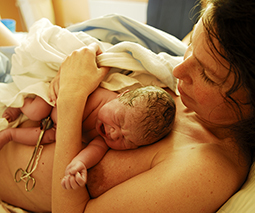This mum was a surrogate for a stranger – and wishes she could forget about it

As the mum of two small humans, the idea that someone would offer to carry a baby for someone else is truly mind-blowing.
I mean. Morning sickness anyone? And … um … contractions?
Not to mention that in Australia it is illegal to surrogate for financial gain.
Which means, in some circumstances, having a pregnancy massage paid by the couple you’re carrying for is considered illegal. You, as the surrogate, have to bear any costs that are incurred when you try to alleviate all the aches and pains of childbearing.
But this is exactly what Keira, a friend of mine did. I saw that she was pregnant for a third time on Facebook, but I never saw pictures of the baby. Which is unusual, because Keira always posts about her two daughters. So what happened to her third?
Read more about surrogacy:
- Real life: ‘I’m a surrogate but it’s the mothers who are the strong ones’
- My story: When my sister couldn’t fall pregnant, I offered to be surrogate
- Great mum acts as surrogate for her cancer survivor little sister
Keira had decided to surrogate for a stranger
I never saw photos of the baby because Keira’s pregnancy was for a childless couple. She was a “gestational surrogate” – which means she carried an embryo created from the woman’s egg and her husband’s sperm. The baby was given to the parents almost as soon as she was born.
It wasn’t the first time Keira had done this either. A few years before she had decided to help some friends who couldn’t conceive. That pregnancy was terminated after a test revealed the baby had Trisomy 18, or Edwards syndrome (a chromosomal abnormality that means most babies won’t live beyond their first year).
A legal versus a moral decision
For Keira, the termination was devastating. Her friends wanted her to terminate, but she wasn’t sure.
“It was probably one of the most difficult decisions I’ve had to make in my life. It’s a really unusual decision because legally it was my decision. Morally it was theirs.”
Keira went on to have a second child with her husband. During that pregnancy, she decided that she wanted to try surrogacy again.
“The first time I did it, it was just about helping friends become parents. The second time round it was a bit of unfinished business. It’s really hard to even get to the starting line with surrogacy. There are so many hoops you have to jump through, so many tests. I wanted to get to the end. I wanted to feel that moment of being able to give that gift.”
This time, though, she wouldn’t be a surrogate for close friends she had known for years.
Listen to Keira on Kinderling Conversation
How do you choose a couple to surrogate for?
The surrogacy community in Australia is quite small, so Keira reached out to them. She spread the word that she wanted to get to know the couple she would be carrying for. She had lots of people contact her, but not all of them were interested in forming a relationship.
“It’s like dating. People put their best foot forward and unfortunately, sometimes it’s not completely real. If they haven’t dealt with the inability to carry, particularly the women (obviously with men they’ve never been to carry so there is no loss there for them) – but for women that haven’t dealt with that, it can bring up so many issues for them, it can cause massive issues.”
In the end, she settled on a couple who she believed needed her most.
“I felt sorry for the woman in the relationship, she was a little bit of a lost bird or a lost soul. She was already in her 40s. I had a few people to choose from but the other ones were younger and I thought okay, well if someone doesn’t help her soon then she may not get the opportunity [to have a baby].”
Not all women are choosing to surrogate for free
Keira went through nine months of pregnancy, morning sickness, damage to her teeth, and time away from her own family (her girls were four and two) without any financial reward.
And while it is illegal to accept money for surrogacy, some women are getting paid.
Speaking to the ABC, Simon Creek, head of the Family and De Facto Law team at HHG Legal Group says that surrogacy in Australia is not regulated well enough.
“I’m quite sure commercial surrogacy does take place in Australia, even if it’s between friends etcetera. I’m quite sure money does change hands on this issue.”
The reason that women are not getting paid to surrogate comes down to the ethics. The theory is that if you start paying for surrogacy, you open the floodgates for vulnerable women to be exploited. And yet it seems that even without money changing hands, women are still getting exploited.
There’s also debate around children becoming commodities that are bought and sold.
Even when money is not involved, there are still ethical issues with surrogacy
Keira’s relationship with the couple she was carrying for soured early in the pregnancy. She was working, with two small children and a husband newly diagnosed with cancer. She had no support from the couple (financially or emotionally), and there was no official support to help her deal with her many responsibilities while being uncomfortably pregnant.
While we think about women in third world countries being exploited, she said the lack of support for altruistic surrogates in Australia leaves them open to a different kind of exploitation.
“If you wanted a night off cooking because you’re exhausted, then that could be seen as paying a surrogate to buy her dinner. Pregnancy massage could be seen as paying her, even osteo appointments to keep your body in alignment could be seen as paying the surrogate. And in that way an Australian surrogate, even though they’re doing it altruistically, can be hugely exploited because they’re giving their time, they’re giving their body. I was very, very sick. They’re giving up their family’s time.
“I feel like I missed a whole year of my children’s lives.”
What was meant to be a priceless gift has become a heavy burden
After the baby was delivered, Keira had a fast and scary haemorrhage.
“I lay in bed thinking my children do not deserve to lose their mum for these people.”
About four months after the baby was born, the couple Keira had carried for cut off all communication. Her experience has made her re-evaluate the emotional cost of surrogacy.
“I need to be there for my children. I gave away a year of their life. I was miserable, I was cranky, I was snapping at them all the time. I wouldn’t do it to them.
“A psychologist has said to me it’s like PTSD. The thoughts are intrusive. I wish I could shut them off. I wish I could forget that I had a baby for someone else.”
This post was originally published on Kinderling Kids Radio. Download the Kinderling app for more great stories.









